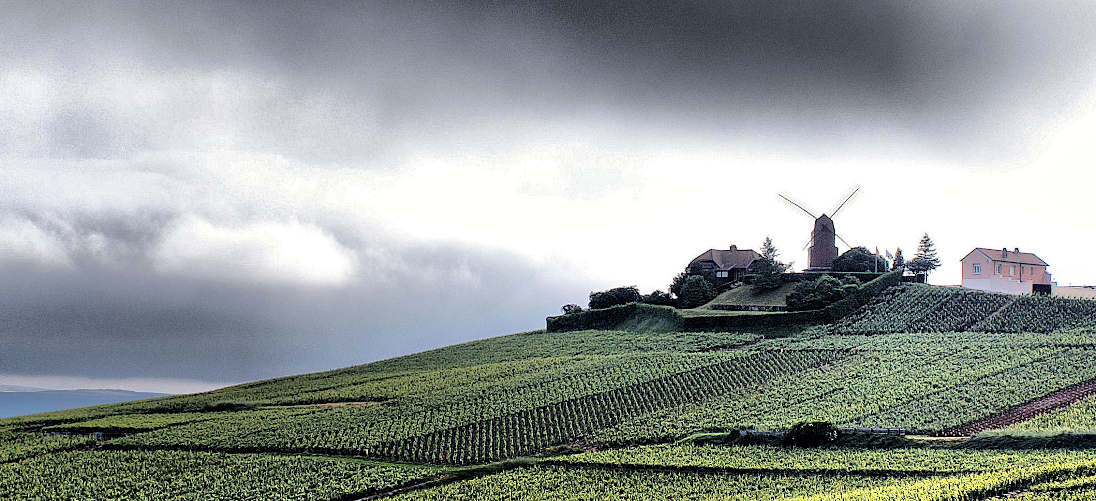
Champagne - an area guide
A short guide to the Champagne-Ardennes area of France
- Explore France ►
- Essential pages
- Travel in France
- Where to go
- What to see and do
About-France.com
- the connoisseur's guide to France
Covering the chalk plains
and
hills of eastern France, between Paris and Lorraine, Champagne is home
to the most famous sparkling wines in the world. A region
in its own right until 2016, it is today one of the constituent areas
of Great Eastern region (Grand Est) of France.| Page index | Regional overview | Main tourist attractions | Selected hotels in Champagne |
Map:
click on icons for more information. 


Champagne vineyard
Champagne, that most delightful of sparkling wines, was not actually invented in the region. According to legend, it was monks who bought the method for making sparkling wine up from the Languedoc, in the south of France; but they soon discovered that the chalky soil and climatic conditions in the Champagne region produced a bright bubbly wine that was in many people's opinion better than the sparkling wines produced further south. There was of course more to the story of Champagne wine than that; commercial success over the centuries had as much to do with the fact that the Champagne region was close to Paris and other great European cities, as with the inherent qualities of the product. But there is no area in France, not even Burgundy, and perhaps no other region in the world, whose name has been made so famous by a local product.
The former Champagne-Ardenne region, is not however one of the most prosperous parts of France; indeed, in terms of GDP, until 2016 when it ceased to exist as an administrative region, it came 17th out of the 21 regions of continental France - though 8th in terms of GDP per inhabitant. The difference is explained by the fact that in spite of bordering on the Paris region, Champagne is a relatively sparsely populated region - forming the north eastern end of what geographers have called the "empty diagonal" of France.
Curiously, the former regional capital Châlons-en-Champagne is by no means the main city in the area; this honour goes to the former capital Reims (often spelt Rheims in English), one of the great historic cities of northern France, and four times the size of Châlons.
The Champagne-Ardenne area consists of four departments - the Ardennes (08), the Aube (10), the Marne (51) and the Haute-Marne (52). The area is bordered by Belgium in the north, by Lorraine in the east, by Franche-Comté and Burgundy in the south, and by the Paris region and Picardy in the west.
The region is made up essentially of areas of relatively flat agricultural land and areas of gently undulating hills. The hills are higher and more pronounced in the north of the region - the area of the Ardennes - and the south of the region, an area known as the Plateau de Langres. The central part of Champagne is an important agricultural area, with vast expanses of cereal production, and – in particular north of Reims – production of vegetables and sugar beet. In the north of the Ardennes department, the landscape is characterised by wooded hills and valleys. The famous vineyards of Champagne lie on the chalky hills to the south west of Reims, and around the town of Epernay.
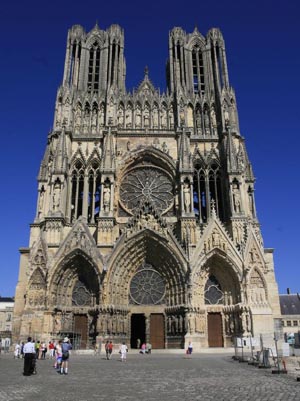
Reims
cathedral - photo Kessiye.
Reims
Reims, a university city, has all the feel of a bustling regional capital; the old city is dominated by the 13th century cathedral, one of the great gothic cathedrals of northern France, and a UNESCO world heritage site. Badly damaged in the first world war (see WW1 sites and map), the cathedral has been painstakingly restored to its true glory.Reims is home to some of the major Champagne producers, such as Taittinger, and cellar tours are available.
Troyes
In the middle ages, Troyes was home to one of the greatest fairs in Europe, being one of the venues of the Champagne Cloth Fairs. Located since Roman times at the intersection of major routes (as it still is today, being where the A5 and A26 motorways meet), Troyes attracted merchants and buyers from all over Europe, in particular manufacturers from the Low Countries and buyers from Italy and southern or southeastern Europe.Troyes has a rich history, and a rich heritage to go with it; unfortunately the city has suffered from a number of disasters, including great fires and hurricanes which occasionally occur in this part of France; yet the city today has a fine historic centre, with many half-timbered houses and some fine churches, in particular the Cathedral of St. Peter and St. Paul. The current cathedral, with its fine 16th century late gothic west facade, was begun in the 13th century, and has some beautiful century stained glass dating from this period.
More recently, Troyes, with its history as a textiles centre, has become the French capital of retail outlet parks.
 Wine
tourism and cellar visits
Wine
tourism and cellar visits
While Reims is the capital of the Champagne wine industry ,
for perhaps the most
enjoyable cellar
visits and Champagne tasting, many visitors will prefer to visit the
smaller town of Epernay,
fifteen miles south of Reims. Lying in the
heart of "Champagne country", Epernay is home to many of the most
famous Champagne producers, including Moët & Chandon
or
Perrier-Jouët.
The town being small, it is easy to
visit a
number
of Champagne houses or cellars on foot. There are in all some 450 producers and cooperatives in the Champagne wine area, many of them quite small, and to discover them and the vineyards visitors can follow signposted Champagne discovery trails. Well marked wine trails start from Reims and from Epernay, indicated by brown "route des vins" signboards for cars, and green waymarkers for cycle trails. These take visitors through the famous vineyards and through villages where – depending on the time of year – small Champagne houses, many of them family-run, may be open for champagne-tasting, direct sales and even guided tours. One such small family-run Grand Cru Champagne house is the Lamiable estate at Tours sur Marne, south of Reims, which runs guided tours and tastings. Check out the availabilities and book here.
Finally, there is another small area producing champagne, which is quite distinct from the Reims-Epernay vineyard. The southern Champagne vineyard area lies in the Aube department, southeast of Troyes between the towns of Bar sur Aube and Les Riceys.
For a choice of vineyard tours and tastings, check out the options and book through Viator
Other highlights of Champagne
With its great medieval cathedral, where in a bygone age the Kings of France were crowned, the city of Reims is a must-see site. Further south, among the many historic sites in France that are less known than they ought to be, the small hill town of Langres, in the south of the area, must be near the top of the list. Sometimes referred to as the "Carcassonne of the North", the old town is a remarkable ensemble of historic stone buildings, enclosed within 3.6 kilometres of ramparts, mostly dating from the 13th and 17th centuries. But parts are much older, as Langres has been a fortified city since Roman times; and unlike Carcassonne, Langres is not jam-packed with tourists.The Champagne region prides itself on historic links with some of the most iconic leaders that France has ever had - and in particular Joan of Arc (Jeanne d'Arc), who came from the village of Domrémy, now in the Aude department, and General de Gaulle, who is buried at Colombey les Deux Eglises, in the Haute Marne. Contrary to false information repeated on several websites, de Gaulle was not born here, and had no ancestral link to the region.
Main tourist attractions in Champagne and the Ardennes
- Champagne cellars visits and tours (51): at Rheims and at Epernay. Travel underground and see how the sparkling Champagne wine is blended bottled and matured. Check out the options and book your tour on Viator
- Charleville Mézières (08): capital of the Ardennes department, birthplace of the poet Rimbaud. Old town.
- Colombey les Deux Eglises . General de Gaulle's country residence, La Boiserie, is now open to the public. De Gaulle is buried in the village cemetery
- Epernay: the "champagne capital", small town in the hills south of Reims, with many of the biggest champagne producers. Cellar tours, champagne tours.
- Reims: one of the finest medieval cathedrals in France. Once the kings of France were crowned here. Historic city centre. Basilique St. Rémi, Roman triumphal arch, Champagne cellar visits.
- Lac du Der (52) . the biggest reservoir in Europe (48km²), built in 1967, this lake has become a particularly important area on the migration routes of water birds. The annual visits of flocks of cranes draw birdwatchers from all over Europe. See Birds in France
- Nigloland (10): Near Bar sur Aube: one of the biggest theme parks in France
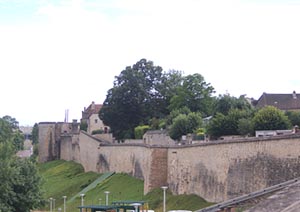
Langres -
- Langres (52) ; fortified hill town with 3.6 km of ramparts and city gates. Off the beaten track, the historic stone-built town centre is a remarkable ensemble. A gem
- Regional natural parks (51): the Montagne de Reims, hills south of Reims; the forêt d'Orient, near Troyes.
- River tourism: the Seine, the Marne, the Aube and various canals.
- Sedan, Château-fort (08) - purportedly the biggest ancient fortress in Europe, built in the early fifteenth century.
- Troyes (10): 13th - 16th century gothic cathedral with fine stained glass; historic city centre.
Going
further : Official
Champagne-Ardenne area tourism site
Click here for
low-cost car hire in France
low-cost car hire in France
Champagne accommodation
A
small
hand-picked selection of hotels in
the Champagne region.
All these
Champagne hotels have been selected on account of their
generally good
user reviews:
Click
hotel name for more details, with online booking and best
rates.
For full lists of Champagne hotels, see below.Reims - Epernay - Troyes area:
| Epernay : *** Hotel Jean Moët |
| Epernay : **** Hotel Villa Eugène |
| Epernay : ** Campanile Epernay - Dizy |
| Etoges, near Epernay :
**** Chateau hotel Chateau d'Etoge |
| Reims: *** Hotel Mercure Reims centre |
| Troyes: *** Hotel Mercure Troyes centre |
Ardennes area :
| Sedan *** Hôtel
le Château Fort - well recommended |
| Sedan : ** Campanile Sedan |
The About-France.com choice of hotels:
About-France.com takes the hassle out of finding a good hotel; we have read hundreds of hotel reviews on different websites, excluded hundreds of hotels from our listings, and only kept those for which the favourable or very favourable reviews well outnumber the poor write-ups. As a result, our hotel lists are short and very selective.Naturally, the type and quality of service provided will vary according to the type of hotel chosen; visitors cannot expect the same service or room quality in a two-star hotel as in a four-star chateau hotel. Our choice lists hotels that are generally judged to be above average or well above average for their category.
Visiting Paris?
See our selection of Paris hotels.
More Champagne accommodation
About-France.com
Home
page - Regions
- Maps of France
- Contact
Photo
top of page: La montagne de Reims - emblematic heart of the
Champagne vineyard
The capital of the Champagne area was Châlons en Champagne.
Known worldwide for its sparkling wine, the region can be easily reached thanks to good road and rail connections.
The Grand Est region also includes Lorraine and Alsace.
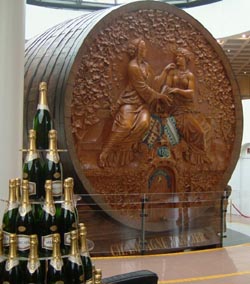
Champagne cellar, Epernay.
Photo by Greenacre8
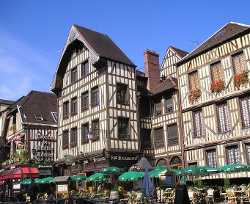
Old Troyes
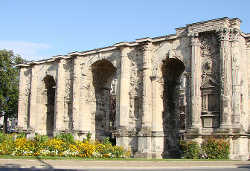
Reims: Roman triumphal arch
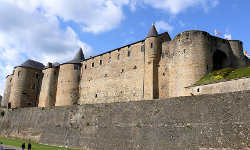
Sedan, the fortress Photo Mossot
Language note: in French, the Champagne region is called " la Champagne", the sparkling wine is "le champagne".
Text Copyright © About-France.com
Photo top of page by CpaKmoi - licence Creative Commons 2
Langres photo by Chelmsfordblue -
Other photos licenced cc Creative Commons when indicated
Site
search
About-France.com
What are you looking for ? Where do you want to go?
About-France.com
What are you looking for ? Where do you want to go?
Grand-Est region - Champagne
The former region of Champagne-Ardenne, lying in the northeast of France between Paris and Belgium, is now the northern part of a larger region known as Grand-Est.The capital of the Champagne area was Châlons en Champagne.
Known worldwide for its sparkling wine, the region can be easily reached thanks to good road and rail connections.
The Grand Est region also includes Lorraine and Alsace.
Champagne discovery tours.
Day trips to Champagne, from Paris, by coach or minibus, are available and can be booked online from Paris City Vision.
Click for offers and details
Day trips to Champagne, from Paris, by coach or minibus, are available and can be booked online from Paris City Vision.
Click for offers and details

Champagne cellar, Epernay.
Photo by Greenacre8
Click
here for Champagne wines

Old Troyes

Reims: Roman triumphal arch

Sedan, the fortress Photo Mossot
Language note: in French, the Champagne region is called " la Champagne", the sparkling wine is "le champagne".
An
independent website, About-France.com is an affiliate partner
of
selected travel service websites,
and may receive a small commission on sales generated after users click
through to a partner site.
| ►► Site guide |
| About-France.com home |
| Full site index |
| About-France.com site search |
| ►► Principal chapters on About-France.com : |
| Guide
to the
regions of France Beyond
Paris, a guide to the French regions and their tourist attractions.
|
| Guide
to Paris Make
the most of your trip to Paris; Information on attractions, Paris
hotels, transport, and lots more.
|
| Accommodation
in France
The different options, including hotels,
holiday gites, b&b, hostels and more
|
| Tourism in France
The
main tourist attractions and places to visit in France - historic
monuments, art galleries, seasides, and more
|
| Planning
a trip to France
Information
on things to do before starting your trip to France.
|
| Driving
in France
Tips
and useful information on driving in and through France - motorways,
tolls, where to stay....
|
| Maps
of France
Cities,
towns, departments, regions, climate, wine areas and other themes.
|
| The
French way of
life
A mine of information about
life and living in France, including
working in France, living in France, food and eating, education,
shopping.
|
| A-Z
dictionary of France Encyclopedic
dictionary of modern France - key figures, institutions, acronyms,
culture, icons, etc.
|
Text Copyright © About-France.com
Photo top of page by CpaKmoi - licence Creative Commons 2
Langres photo by Chelmsfordblue -
Other photos licenced cc Creative Commons when indicated
